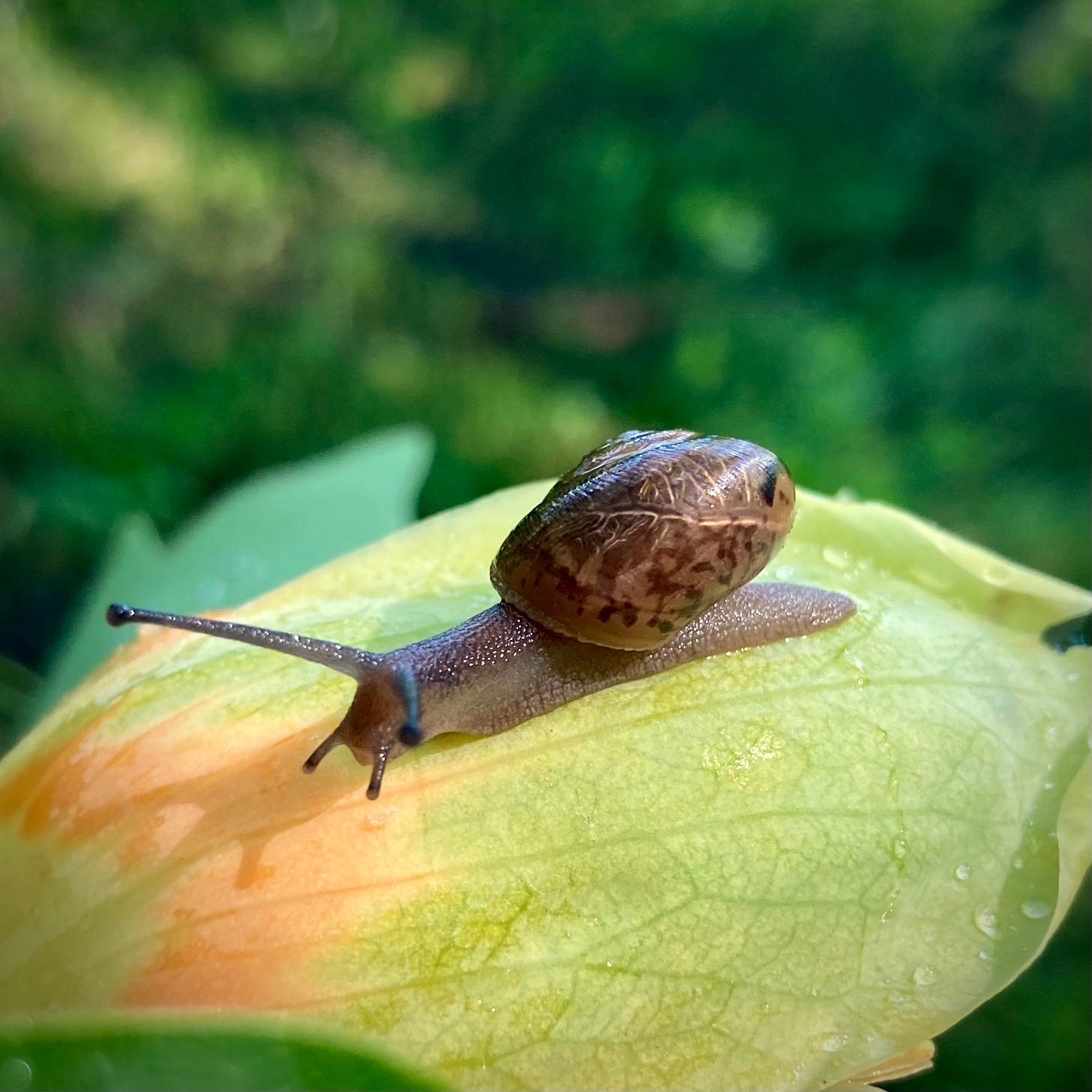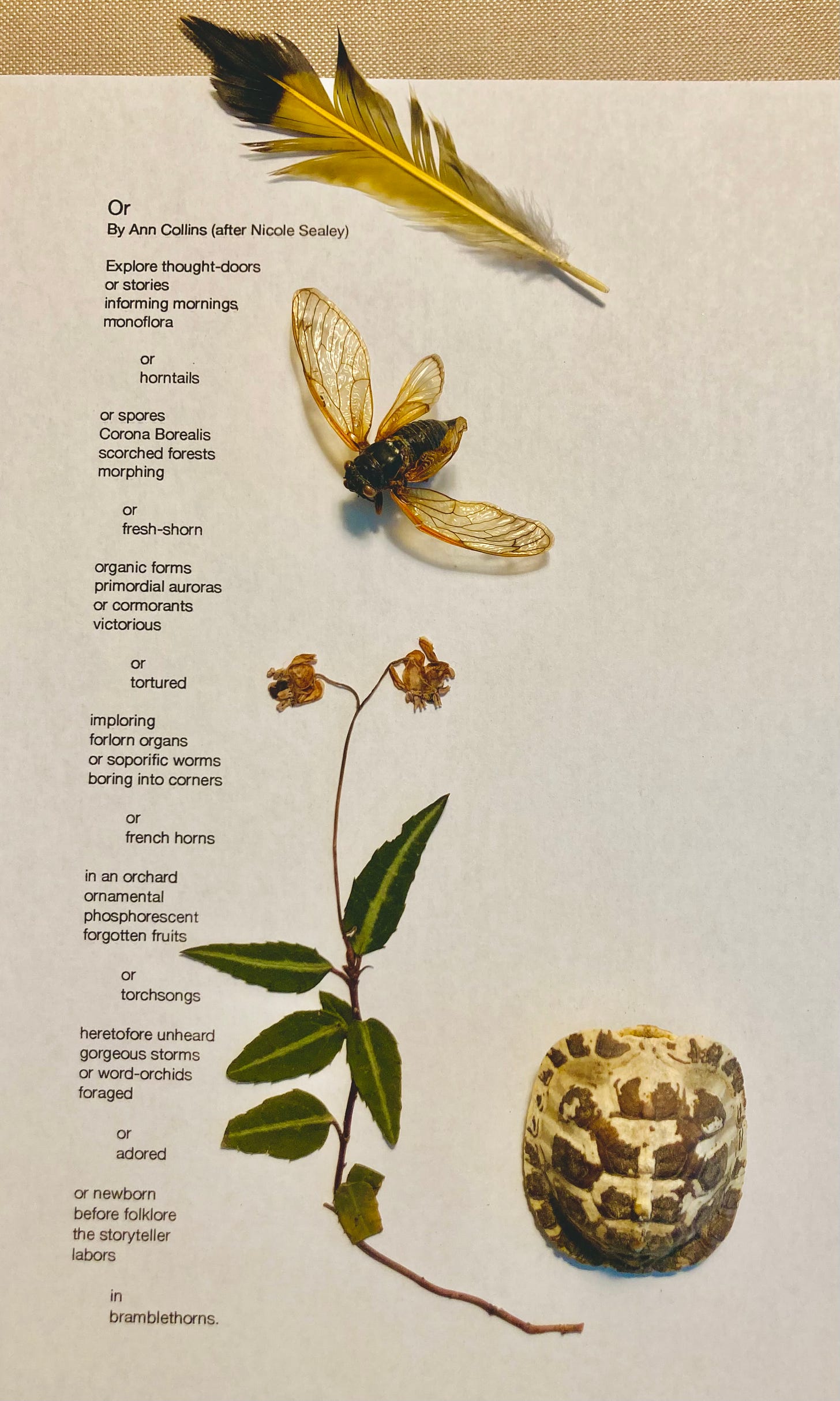Or
After Nicole Sealey's "And"
The single word "or" haunted my dreams before it became a poem—appearing not as a divider but as connective tissue, the way roots underground bind the trees into one forest. Here’s a poem that was inspired by my reading of Nicole Sealy’s poem And.
Or
By Ann Collins (after Nicole Sealey)
Explore thought-doors
or stories
informing mornings
monoflora
or
horntails
or spores
Corona Borealis
scorched forests
morphing
or
fresh-shorn
organic forms
primordial auras
or cormorants
victorious
or
tortured
imploring
forlorn organs
or soporific worms
boring into corners
or
french horns
in an orchard
ornamental
phosphorescent
forgotten fruits
or
torchsongs
heretofore unheard
gorgeous storms
or word-orchids
foraged
or
adored
or newborn
before folklore
the storyteller
labors
in
bramblethorns.
Dear One,
I spent April in Marjorie Lotfi's morning poetry class, and it felt like tending a garden at dawn. A stolen hour of deep work and beauty. Each day, we'd gather online with our coffee and notebooks, ready to dig into the soil of language together.
Marjorie has this gift for creating a space where no observation feels too small. She'd begin by reading poems aloud, sometimes twice, letting the words settle differently each time. She would then point out a few helpful craft points: how a line break creates suspense, how repetition can work like a heartbeat, how white space speaks as loudly as words. Marjorie found the pulse of life in each poem—the thing trying to emerge. She taught us that craft isn't all about rules, but about discovering what your particular poem needs to breathe. She taught us to read like writers, seeing poems not just as finished objects but as a series of deliberate choices.
The writing prompts that followed always surprised me. Below, I’ve illustrated my poem with a few natural treasures gleaned on my walks. These are tangible signs of the desire that drives me to explore and celebrate the microseasons where I live.
By the end of April, I realized these morning sessions had shifted something fundamental in my writing practice. It wasn't just about learning techniques—it was about developing a more generous relationship with language itself. In Marjorie's class, we learned to approach each poem like a conversation with a friend: curious, patient, ready to be surprised.
Those April mornings reminded me why I write in the first place—not to be perfect, but to pay attention, to connect, to discover what I didn't know I knew until the words themselves showed me. To fall in love with the sound of words.
I hope your current projects are calling to you every morning. I hope they’re bringing you new insight and deep, purposeful joy!
I’ll see you in a new microseason,
xo Ann

Have you taken any classes that helped you move beyond your current boundaries?
Share your favorites in the comments.
And, if anything in this post playfully pokes your curiosity, I’d love to know!




This is a beautiful poem, Ann. I really like how some of the words and phrases you use sound and connect with one another. For example:
"scorched forests
morphing"
I like the way this sounds and the imagery created.
Also, I like the image you have created with your poem and the "natural treasures gleaned" from your walks. I like the colours in the image and coincidently, the golden shade to them made me think of your poem title "Or" and if the title is read in French means Gold. Thank you for sharing.
What a cool poem -- or should I write, "I adore your words?"
I think for me, there isn't a particular class I can think of that really moved me in that way. For me, it has been more about "eureka moments" sometimes coming in the most unexpected classes and lessons. A brief mention of a little thing has sometimes felt like a great ray of sunlight shooting through a small hole in the fabric of information, to put it poetically. Sometimes it has been the most random stuff that has ended up evoking something in me and changed me forever.
I collect those moments like treasures. They seem to make all the difference for me.